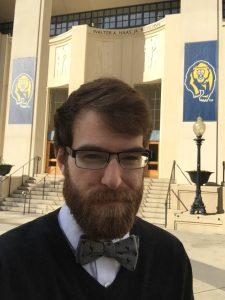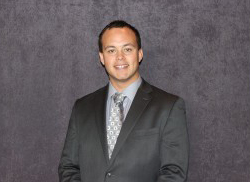This weekend during commencement, an anticipated 3,823 undergraduates will join the ranks of Iowa State alumni. For two materials engineering students, the education and experiences they acquired here at Iowa State will propel them forward into new adventures as Ph.D. students.
Jake Sporrer will head to the University of California-Berkeley to pursue a Ph.D. in electrical engineering. Brian Fuchs will head to Georgia Tech University to pursue a Ph.D. in mechanical engineering.
Even though they are not continuing in materials engineering, both credit their time in the department as the catalyst that put them on their respective paths.
Jake Sporrer
 It all started at a week-long engineering camp.
It all started at a week-long engineering camp.
In the summer of his junior year of high school, Jake Sporrer visited Iowa State and was looking forward to seeing all that the College of Engineering had to offer. He was most excited about seeing the demonstrations given by Dr. Mani Mina in electrical engineering and Dr. Larry Genalo from materials science and engineering.
“At the time, I was in AP Chemistry and I talked with my teacher about it, because I kind of liked chemistry and I kind of liked physics, so he recommended materials engineering,” Sporrer said. “After I saw [Genalo’s] demo I was like, ‘this is the coolest stuff ever!’ Nationwide, our department is one of the best, so it was a pretty easy choice. In-state-tuition, great department, great content, and great people.”
Sporrer joined the materials science department in his freshman year at Iowa State and got involved right away. He was a member of the Materials Engineering Learning Community, where his peer mentor encouraged him to join Iowa State’s nationally-recognized chapter of Material Advantage, the premier organization for materials science and engineering students. Sporrer first served as events chair and later moved to outreach chair.
“So the demos that I saw Dr. Genalo do that I thought were so cool? I got to do,” Sporrer said of conducting outreach events.
Sporrer later received a Material Advantage Scholarship, which allowed him to go to The Minerals, Metals, and Materials Society (TMS) annual conference. While there, he saw a talk about materials engineering outreach where the speaker showed a Minecraft modification he had made that incorporated polymers into it. Sporrer was so intrigued that he reached out to the speaker.
“We met and talked for about an hour and then he asked me if I wanted to go to Texas and do research with him,” Sporrer said. “So I spent a summer in Texas doing polymer research.”
While his mentor worked on flexible electronics, Sporrer worked on 3D printing of piezoelectric polymers, or polymers that have the ability to generate large alternating current (AC) voltages. This led Sporrer to specialize in metals, polymers, and electronics at Iowa State, where he finds flexible electronics most fascinating.
“But it all started when my peer mentor said, ‘come to this Material Advantage meeting,” Sporrer said.
Sporrer was heavily involved in research at Iowa State. He worked in Dr. Mufit Akinc’s lab as a freshman, then joined up with the Center for Nondestructive Evaluation. Most recently, he has been doing research in Dr. Martin Thuo’s lab working with metal micronanoparticles and molecular electronics.
Sporrer’s knowledge of 3D printing and electronic properties that he has been honing since his freshman year will soon take him to new places. He will be pursuing a Ph.D. in electrical engineering at the University of California-Berkeley where he will join a research group working on printed electronics.
“We learned a lot of awesome stuff as undergrads here,” Sporrer said. “I think it will be really interesting to kind of branch out into some different content because I have this really solid base from my undergrad.”
The lab Sporrer will be joining at Berkeley does a lot of printing of nanoparticles and regularly works with conductive inks. Sporrer’s knowledge of fluid dynamics, kinetics, thermodynamics, and charge transport will come in handy as he delves deeper into electronics and device physics.
Thanks to his time at Iowa State, Sporrer is confident that he is ready for this new adventure. After commencement this weekend, he will head out west with not only a degree in materials engineering, but with minors in computer science and nondestructive evaluation and specializations in metals, polymers, and electronic properties of materials.
“Being here at Iowa State, I’ve tried to learn as much about as many things as I could,” Sporrer said. “You never know what you’re going to need in your toolbox in order to solve a problem in the future.”
Keeping his toolbox well stocked is a lesson Sporrer intends to keep as he embarks on this new adventure in California. Along with that lesson, Sporrer hopes to continually be inspired by the people and work around him as he was at Iowa State.
“It’s hard to choose what I’ll miss most,” he said. “I think it’s the lectures that kind of keep you sitting up, when you see something on the board and you go, ‘no way. There’s no way that’s right.’ And then the professor proceeds to tell you exactly why it’s right, how they proved it’s right, and what it means in terms of implications for the real world.”
“And obviously I’ll miss the people,” Sporrer concluded. “Everyone here is really nice and great to work with. It’s really nice to be able to just knock on my professor’s door and talk with them.”
Brian Fuchs
 For Brian Fuchs, materials engineering was not even on his radar when he stepped foot onto the Iowa State campus. He actually came in as a chemical engineering major.
For Brian Fuchs, materials engineering was not even on his radar when he stepped foot onto the Iowa State campus. He actually came in as a chemical engineering major.
“I looked at my four-year plan and I realized chemical engineering was not where I wanted to go,” he said. “There were all of these classes on thermodynamics and heat transfer and I realized I would rather be working with the materials themselves.”
When a friend facing a similar situation switched over to materials engineering, Fuchs followed suit and changed majors during his second semester.
It was a failure analysis class he took during his sophomore year that first piqued his interests. He later completed an internship at Mercury Marine in Wisconsin where he spent his summer completing different analyses.
“Going through the different modes of failure and analyzing them, I thought that was just fantastic and that I could do that for a long time,” he said. “It was like the closest I’ll ever get to being a detective.”
Later on, a class in nondestructive evaluation put Fuchs onto his current research path. The class covered a wide range of topics from ultrasound to visual and electrical inspections.
“I thought it was really fun with all of the different ways you could inspect these parts,” he said.
Through an internship at Pacific Northwest National Lab in Richland, Washington and an independent study with Professor Nicola Bowler here at Iowa State, Fuchs was able to delve even deeper into NDE and decided to devote his Ph.D. research to that topic.
In the fall, Fuchs will head to Georgia Tech University in Atlanta to pursue his Ph.D. in mechanical engineering. His internship at Pacific Northwest National Lab exposed him to a particular line of research and Fuchs was later put in contact with the person who originated it. That contact told him about how she got started at Georgia Tech and encouraged Fuchs to reach out to her advisor. He is now set to join that lab when he arrives in Atlanta
“It was kind of one of those lucky things,” Fuchs said. “I happened to find something I really like and then I found someone I could work for doing that.”
Though Fuchs actually graduated from Iowa State last December, he stuck around the materials engineering department stepping in as a temporary laboratory coordinator while continuing some research. He said that while that experience was and still is hectic at times, it was totally beneficial and better equipped him for life in future labs.
“When I approach a lab [now], I have a little bit more perspective of what safety things will need to be taken care of and the organization aspects that could make life easier down the road,” Fuchs said. “I got a lot of hands-on experience with a bunch of different equipment that I would have only used sparingly as well.”
Fuchs feels prepared for his new adventure thanks to the excellent base Iowa State provided him.
“In high school, I learned the basics,” he said. “Now I know a lot about materials engineering as a base and I’ve had a lot of lab experience and hands-on stuff. So now I’m ready to move on to some something more specialized in this NDE field and build my knowledge up from there.”
Fuchs said the mechanical engineering at Georgia Tech is a very large department, so he will miss the small-department feel he is now leaving behind.
“I’m going to miss that feel where I know pretty much the majority of my classmates and the majority of my professors,” he said. “I’d like to see if I can still foster that sense of community in such a large place.”
To further foster that sense of community, Fuchs hopes that some fellow Iowa Staters will join him in Atlanta.
“I don’t want to be the only Iowa State person down there,” he laughed.